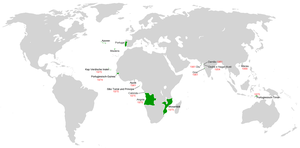Overseas Province (Portugal)
The term overseas province ( província ultramarina ) was derived from the Portuguese Estado Novo as an administrative name for the Portuguese colonies Angola , Cape Verde , Mozambique , Portuguese Guinea , Portuguese India , Portuguese Timor , Macau , São João Baptista d'Ajudá and São Tomé and Príncipe used.
The Portuguese territories in India were the first to be so designated in 1946, followed by the other Portuguese colonies in 1951 with their corresponding declaration in the Portuguese constitution . In this way Portugal wanted to avoid continuing to be viewed as a colonial power internationally. This also ended the use of the term Portuguese Colonial Empire ( Império Colonial Português ). The United Nations Security Council rejected the construction of the overseas territories as an "overseas province" in Resolution 180 on July 31, 1963. The refusal to adopt a policy of decolonization was condemned as a violation of UN obligations and a threat to peace and security in Africa. However, there were no punitive measures against the NATO country Portugal, as they would have blocked the Western powers with their veto.
Due to the connection to the Portuguese motherland, the autonomy status also changed. Black African residents now had the opportunity to be legally recognized as an assimilado if certain criteria were met . This status granted extensive equality with the Portuguese of the mother country.
The regime under António de Oliveira Salazar and later Marcelo Caetano saw in the overseas possessions an integrated and inseparable part of Portugal, a "multiethnic and pluricontinental nation" ( Nação Multirracial e Pluricontinental ).
After the Carnation Revolution in 1974, the Portuguese colonies in Africa became independent. Portuguese Timor's independence was initially delayed by civil war between the colony's two main parties. The Portuguese administration withdrew from the capital Dili and FRETILIN , who emerged victorious from the conflict, unilaterally proclaimed independence on November 28, 1975 due to the threat from neighboring Indonesia , which was only recognized by a few states. Nine days later, Indonesia officially began occupying the neighboring country. Internationally, Portuguese Timor was considered to be Portuguese territory under Indonesian administration until 1999, despite its annexation . Then the United Nations took over and finally released East Timor into independence in 2002. Macau was given the status of a Chinese territory under Portuguese administration until it was peacefully transferred to the People's Republic of China in 1999 .
See also
supporting documents
- António Henrique de Oliveira Marques : History of Portugal and the Portuguese Empire (= Kröner's pocket edition . Volume 385). Translated from the Portuguese by Michael von Killisch-Horn. Kröner, Stuttgart 2001, ISBN 3-520-38501-5 (Original title: Breve história de Portugal. ).
Individual evidence
- ^ Diário do governo: Law 2048 , June 11, 1951
